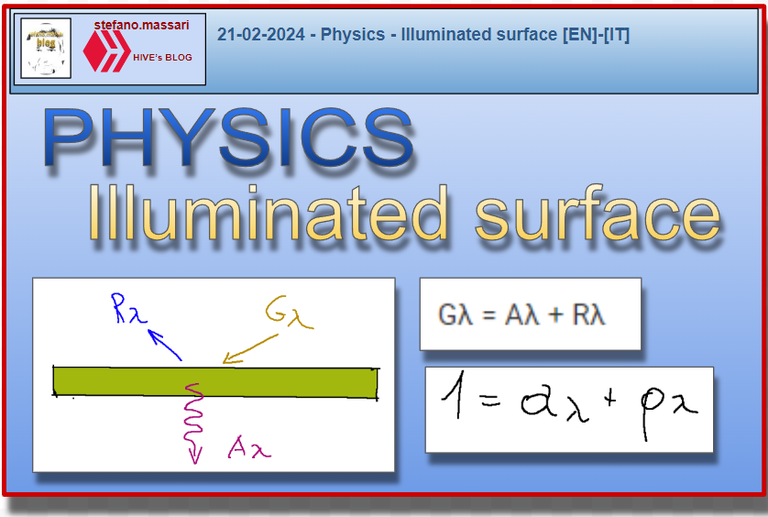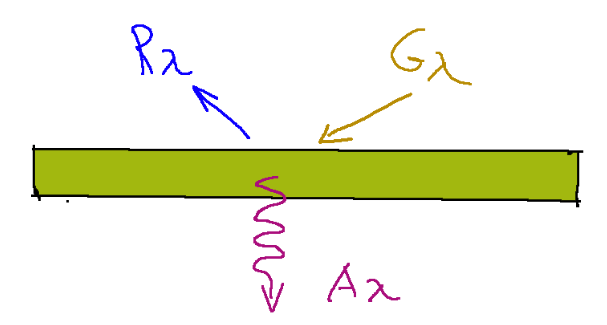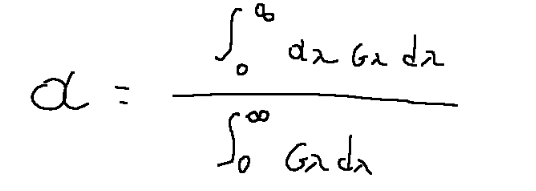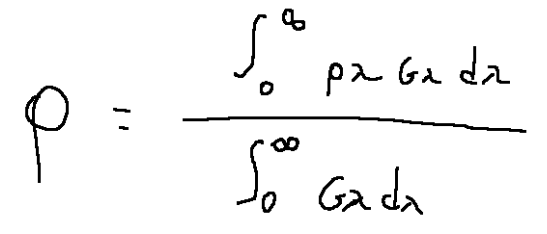21-02-2024 - Physics - Illuminated surface [EN]-[IT]

~~~ La versione in italiano inizia subito dopo la versione in inglese ~~~
ENGLISH
21-02-2024 - Physics - Illuminated surface [EN]-[IT]
Basic concepts
In thermodynamics there are some basic concepts that are always good to keep in mind.
Below are two of the most classic when we talk about thermodynamic cycles.
What is the difference between a refrigerator and a heat pump?
-The refrigerator is a system in which the SET A temperature is controlled, the heat pump is a system in which the SET B temperature is controlled.
-The coefficient of useful effect of the refrigerator (εf) is equal to the thermal energy removed from the heat reservoir at a lower temperature with the work L on the mechanical energy supplied.
Illuminated surface
To understand the absorption of an illuminated surface we must remember some things, below are the factors to keep in mind.
Gλ = radiant energy that affects the surface of a body
Rλ = reflected radiation
Aλ = absorbed radiation
Tλ = transmitted radiation
The mathematical relationship that indicates how much radiant energy affects the surface of a body is the following.
Gλ = Aλ + Rλ + Tλ
For the case study of an illuminated surface we take the case of an opaque body, i.e. the case in which the transmitted radiation is zero (Tλ=0)
At this point we return to the formula of the radiant energy that affects the surface of a body seen before.
Gλ = Aλ + Rλ + Tλ
Remembering that Tλ = 0 becomes like this
Gλ = Aλ + Rλ
We can now draw our opaque body by noting the radiation at play in this case.

ελ is the ratio between the radiant energy emitted by a real surface at temperature T sup, wavelength λ, per unit area and time, and the radiant energy that would be emitted by a black surface in the same conditions.
In this case we have that ελ = αλ
This means that if ελ is known, the monochromatic absorption and reflection coefficients are also known.
Therefore for an opaque body the following relation holds

Where:
αλ = absorption coefficient
ρλ = reflection coefficient
For the relative total quantities we will have the following relationships:


Conclusions
We can deduce that both α and ε do not depend on the wavelength.
Request
When we talk about making a home energy efficient we start talking about opaque bodies. Have you already heard of opaque bodies when it comes to housing?

21-02-2024 - Fisica - Superficie illuminata [EN]-[IT]
Concetti base
Nella termodinamica ci sono alcuni concetti base che è sempre bene tenere in mente.
Qui di seguito due tra i più classici quando parliamo di cicli termodinamici.
Che differenza c'è tra frigorifero e pompa di calore?
-Il frigorifero è un sistema in cui viene controllata la temperatura SET A, la pompa di calore è un sistema in cui è controllata la temperatura SET B.
-Il coefficiente di effetto utile del frigorifero (εf) è uguale all'energia termica sottratta al serbatoio termico a temperatura inferiore con il lavoro L sull'energia meccanica fornita.
Superficie illuminata
Per capire l’assorbimento di una superficie illuminata dobbiamo ricordare alcune cose, qui di seguito i fattori da tenere in mente.
Gλ = energia raggiante che incide sulla superficie di un corpo
Rλ = radiazione riflessa
Aλ = radiazione assorbita
Tλ = radiazione trasmessa
La relazione matematica che indica quanto è l’energia raggiante che incide sulla superficie di un corpo è la seguente.
Gλ = Aλ + Rλ + Tλ
Per il caso studio di una superficie illuminata prendiamo il caso di un corpo opaco, cioè il caso in cui la radiazione trasmessa è zero (Tλ=0)
A questo punto riprendiamo la formula dell’energia raggiante che incide sulla superficie di un corpo vista prima.
Gλ = Aλ + Rλ + Tλ
Ricordando che che Tλ = 0 diventa così
Gλ = Aλ + Rλ
Possiamo ora disegnare il nostro corpo opaco annotando le radiazioni in gioco in questo caso.

ελ è il rapporto tra l’energia raggiante emessa da una superficie reale a temperatura T sup, lunghezza d’onda λ, per unità di area e di tempo, e l’energia raggiante che sarebbe emessa da una superficie nera nelle stesse condizioni.
In questo caso abbiamo che ελ = αλ
Questo significa che noto ελ, sono noti anche il coefficiente di assorbimento e quello di riflessione monocromatico.
Quindi per un corpo opaco vale la seguente relazione

Dove:
αλ = coefficiente di assorbimento
ρλ = coefficiente di riflessione
Per le relative grandezze totali avremo le seguenti relazioni:


Conclusioni
Possiamo dedurre che sia α che ε non dipendono dalla lunghezza d’onda.
Domanda
Quando si parla di efficientamento energetico di una casa si inizia a parlare di corpi opachi. Avete già sentito parlare di corpi opachi quando si entra nel discorso abitazioni?
THE END
Energy transformation is beautiful! Hehehe physics explain how the different types of energy can be converted
`
Want to Know more about Hivepakistan?
Ping Us On Hive Pakistan Discord server
To support HivePakistan, delegate Hive Power to hivepakistan and earn 90% curation reward :)
Here are some handy links for delegation
A delegation of 500 or more HP makes you earn Hivepakistan supporter badge.
`
Thanks for your support. I'll simply summarize this article. The opaque body is defined as follows:
Gλ = Aλ + Rλ
Where:
Gλ = incident energy
Aλ = energy absorbed
Rλ = Reflected Energy
Physics course. Quite so dynamic but pretty straightforward to understand
In this case the concepts can actually be learned quickly. The main concept of this article is the matte body. An opaque body, i.e. one for which Tλ = 0 and therefore the formula of the incident energy is the following
Gλ = incident energy
Rλ = Reflected Energy
Aλ = energy absorbed
Tλ = transmitted energy
Looks like you wrote some signs in the formulas but I didn’t see them well
I can help you by making an extreme summary. The opaque body is defined simply like this:
Gλ = Aλ + Rλ
That is, the incident energy is equal to the absorbed energy + the reflected energy.
In the opaque body Tλ = 0, i.e. the energy transmitted is zero.
I wonder if the principle upon which the heat pump works is a direct inverse of the one by which the refrigerator or air conditioner also works. Thanks for the lesson. Have a great day.
Thanks for noticing something interesting in the basic concepts. Lately I have also enriched these articles with basic concepts. The most interesting formula of this article is the following:
Where:
Gλ = incident energy
Rλ = Reflected Energy
Aλ = energy absorbed
Remember that in the opaque body the energy transmitted is equal to zero.
Tλ = transmitted energy = 0
Thermodynamic always cover a lot of aspect in for us to handle and for us to make use of
Thanks for always being there. Thermodynamics is becoming a very important science for the design of houses that no longer have to waste energy.
Below is the gist of this lesson
How can an opaque body be defined
An opaque body in which Tλ = 0 can be defined as Gλ = Aλ + Rλ
Where:
Gλ = incident energy
Rλ = Reflected Energy
Aλ = energy absorbed
Tλ = energy transmitted
I think if some values is known as variableness, it helps to settle the work earlier
Sì, l'ho sentito ad un evento in uno dei centri commerciali della città.
Ti auguro un felice fine settimana
Ciao LU e grazie per essere passato. Riassumo brevemente il succo di questo articolo qui di seguito.
Come può essere definito un corpo opaco
Un corpo opaco in cui Tλ = 0 avrà Gλ = Aλ + Rλ
Dove:
Gλ = energia incidente
Rλ = Energia riflessa
Aλ = energia assorbita
Tλ = energi trasmessa